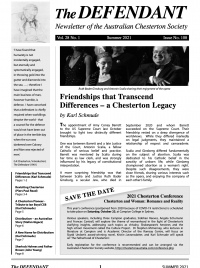Chesterton’s social philosophy of widespread ownership has long been called Distributism. It was never thought to be an entirely suitable word, even by Hilaire Belloc who coined it. But it did convey the essential concept of broadly distributed property as the basis of economic freedom (and other freedoms), in contrast to the private concentrations of wealth in Capitalism and the centralisation of state control in Socialism.
The Australian Chesterton Society has devoted several conferences to Distributism – for example, “Faith in the Marketplace: the Social Catholicism of G.K. Chesterton Revisited” in 2011 and “Reclaiming the Economy – A Chesterton Alternative” in 2019 – but it has usually avoided the term “Distributism” in case the conference theme was unclear to potential attendees.
Chesterton himself described Distributism as an “awkward but accurate name”. Dale Ahlquist, President of The Society of Gilbert Keith Chesterton (formerly the American Chesterton Society) has recently proposed a less awkward word – localism.
Apart from being easier to pronounce, he believes it has a more concrete and recognisable meaning. It already conveys, he suggests, “the support of local production and consumption of goods, local control of government, and promotion of local history, local culture, and local identity, and protection of local freedom. It obviously favours decentralisation and directness, and is even more obviously opposed to globalism and collectivism.” (Gilbert! Magazine, November-December 2020)
By comparison, Distributism is like any term seeking to capture a complex reality – it can conceal more than it reveals. In Dale Ahlquist’s words, it “does not suggest property or small business or self-government or family or freedom.” Moreover, in the present age of exploding state power, it is too easily confused with Re-Distribution, which is based on state-imposed taxes and priorities.
Is Localism a better term? Dale Ahlquist invited reactions from a number of notable American Distributists.
David Cooney of the Practical Distributism blog acknowledges the value of the term Localism but believes it fails to express the fundamental principle of Distributism, which is distributive justice.
Such a principle, argues Cooney, is understood in Catholic social teaching “as a comprehensive and cohesive system, and localism is an integral part of that.” But, he concludes,
“even if we use localism as the means of introducing distributism to a wider audience, we can never really get away from our association with the historic name, . . . [and] it will eventually have to come out that we mean more by it than what the listener will initially assume, more than can be logically encompassed by the name of localism, and that is the opportunity to begin to introduce the wider concepts of distributive justice and distributism as a whole.”
David Cooney of the Practical Distributism blog
Thomas Storck, author of An Economics of Justice and Charity: Catholic Social Teaching, Its Development and Contemporary Relevance (2017), suggests that adopting localism would be a mistake. Distributism has been historically recognised and is used in languages other than English. It has found new expression in the policies of the newly formed American Solidarity Party; while in Australia, it remains part of the platform of the Democratic Labour Party.
Storck favours the continued use of Distributism. He suggests that a supplementary description might explain its meaning more fully – for example, “distributism, the localist system of widespread property ownership”; or “distributism, which is based on a localism that emphasises the primacy of family and place”.
Dale Ahlquist has asked the readers of Gilbert! Magazine: “What do you think?”
Australian Chestertonians might be interested in responding. Comments would be welcome and may be directed to the Editor of the Defendant.
